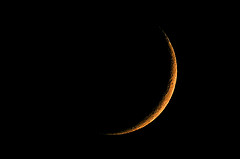
I have recently read an article stating that Rosh Chodesh (New Moon day) is to be celebrated as a Sabbath. The article contained some scriptural references that prompt me to re-evaluate my understanding of Rosh Chodesh. Having studied these scriptural references in their context, we have come to the conclusion that Rosh Chodesh is not a Sabbath, but  should be celebrated as an appointed feast with some very specific instructions. Let me explain…
If Rosh Chodesh was a Sabbath, you would expect to find it described in Levitucus 23 as such. In Leviticus 23 we find specific reference to all the Sabbaths. Leviticus 23 gives us specific instructions on which days we are not allowed to perform servile work. The feast of First Fruits for example is an appointed time, but no mention is made of not being able to perform servile work. In all other cases it is stated specifically what work may be performed.
You will notice in Leviticus 23 that there is no reference to Rosh Chodesh. So what makes Rosh Chodesh an appointed time? The answer lies in the book of Numbers. Here, we find specific instructions with regard to Rosh Chodesh:
In Numbers 10:10 we are instructed to blow the trumpets on the first day of the month (Rosh Chodesh)
Numbers 10:10Â
 10 “Also in the day of your gladness and in your appointed feasts, and on the first days of your months, you shall blow the trumpets over your burnt offerings, and over the sacrifices of your peace offerings; and they shall be as a reminder of you before your Elohim. I am YHVH your Elohim.”2956 חֲצֹצְרָה (ḥǎṣÅ∙ṣerÄ(h)): n.fem.; ≡ Str 2689; TWOT 726a—1. LN 6.83–6.95 trumpet, i.e., a clarion-like wind musical instrument made of metal; a long, slender tube with a flaring bell on the far end, making a loud sound (2Ki 11:14b); 2. LN 6.83–6.95 trumpeter, i.e., one who blows a trumpet (2Ki 11:14a)
Swanson, J. (1997). Dictionary of Biblical Languages with Semantic Domains : Hebrew (Old Testament) (electronic ed.). Oak Harbor: Logos Research Systems, Inc.
In Ps 81:3 the shofar is mentioned:
Psalm 81:3Â
 3 Blow the trumpet at the new moon, At the full moon, on our feast day.
8795 שֹ×ופָר (šô∙pÌ„Är): n.masc.; ≡ Str 7782; TWOT 2449c—1. LN 6.83–6.95 (most versions) trumpet, i.e., a curved animal horn used as a bugling and trumpeting device for signaling (1Sa 13:3); 2. LN 14.74–14.86 unit: קֹול שֹ×ופָר (qôl šô∙pÌ„Är) blast, i.e., the sound of a horn (2Sa 6:15)
Swanson, J. (1997). Dictionary of Biblical Languages with Semantic Domains : Hebrew (Old Testament) (electronic ed.). Oak Harbor: Logos Research Systems, Inc.
The word “full moon” looked up in the original Hebrew could also be “appointed time,” this scripture could also read: Blow the trumpet at the new moon, at the appointed time, on our feast day.
In Numbers 28 we find specific instructions regarding the required offerings for all the appointed times. It starts off with the daily sacrifices, then the weekly sacrifices on Sabbath, then the monthly sacrifices on Rosh Chodesh, then it goes further explaining all the required sacrifices for all the annual appointed times.
Numbers 28:11–15
 11 ‘Then at the beginning of each of your months you shall present a burnt offering to YHVH: two bulls and one ram, seven male lambs one year old without defect;
 12 and three-tenths of an ephah of fine flour mixed with oil for a grain offering, for each bull; and two-tenths of fine flour mixed with oil for a grain offering, for the one ram;
 13 and a tenth of an ephah of fine flour mixed with oil for a grain offering for each lamb, for a burnt offering of a soothing aroma, an offering by fire to YHVH.
 14 ‘Their drink offerings shall be half a hin of wine for a bull and a third of a hin for the ram and a fourth of a hin for a lamb; this is the burnt offering of each month throughout the months of the year.
 15 ‘And one male goat for a sin offering to YHVH; it shall be offered with its drink offering in addition to the continual burnt offering.
Sacrifices are acts of worship unto YHVH. These sacrifices, are to be performed on His appointed times. That is twice daily, then weekly on the seventh day Sabbath, then monthly on the first day of the new month (Rosh chodesh) and then on the other very important annual appointed times – the feasts of YHVH. However, we cannot perform sacrifices at this point in time, as we do not have a Temple.
Rosh Chodesh is an appointed time. It is a special festival with special instructions from our heavenly Father. We are to honor and obey these instructions just like all the other instructions in His Torah.
Rosh Chodesh -a feast
There are also several scriptural references that indicate that Rosh Chodesh was celebrated as a special feast:
1 Samuel 20:5
 5 So David said to Jonathan, “Behold, tomorrow is the new moon, and I ought to sit down to eat with the king. But let me go, that I may hide myself in the field until the third evening.2 Kings 4:23
 23 He said, “Why will you go to him today? It is neither new moon nor sabbath.” And she said, “It will be well.”Isaiah 1:13–14Â
 13 “Bring your worthless offerings no longer,
 Incense is an abomination to Me. New moon and sabbath, the calling of assemblies—
 I cannot endure iniquity and the solemn assembly.
 14 “I hate your new moon festivals and your appointed feasts,
 They have become a burden to Me;
 I am weary of bearing them.
In Ezekiel there is a reference to the future celebration of Rosh Chodesh:
Ezekiel 46:1Â
 1 ‘Thus says YHVH Elohim, “The gate of the inner court facing east shall be shut the six working days; but it shall be opened on the sabbath day and opened on the day of the new moon.
There are also references to Rosh Chodesh in Ezra en Nehemiah that prove that Rosh Chodesh was observed after the return from Babylon.
Another passage which refers to Rosh Chodesh :
Amos 8:5Â
 5 saying, “When will the new moon be over,
 So that we may sell grain,
 And the sabbath, that we may open the wheat market,
 To make the bushel smaller and the shekel bigger,
 And to cheat with dishonest scales,
The above scripture can be understood to mean that the greedy people could not wait for the New Moon festival or the Sabbath to be over in order to buy and sell, thereby implying that the New Moon day was treated like a Sabbath – no buying and selling (See ref. Neh 10:31.) However, we can also see it in the context of not being able to buy and sell grain before the first fruit offering was brought by the Priest at Shavuot.
The latter is in our opinion more accurate since we cannot find another reference in Scripture where it is clearly commanded that Rosh Chodesh should be regarded and celebrated as a Sabbath. I do believe that YHVH would have given us clear instructions if He wanted us to celebrate Rosh Chodesh as a Sabbath. He did give very clear instructions for all the other Sabbaths and Appointed times.
This does not take away from the fact that Rosh Chodesh is an important part of YHVH’s Feast Cycle and we are to follow the instructions given to us regarding it which are: observe the New Moon, blow the Shofar and have a feast!










Leave a Reply